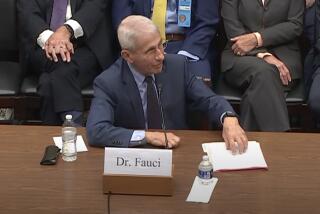Wall St. Panel Stymied on How to Deal With Rumors
- Share via
WASHINGTON — Against a backdrop of seemingly unquenchable pre-takeover run-ups in the stocks of target companies, the Securities and Exchange Commission on Wednesday convened a panel of exchange officials, company executives and professional traders to discuss how to avert market rumor-mongering and force companies to fully disclose their merger plans.
The consensus could not be comforting: Tracing the source of rumors is a nearly impossible task, and forcing full disclosure would produce insoluble legal problems for companies while potentially killing deals.
“You’re damned if you do and damned if you don’t,” Merrill Lynch & Co. Chairman William A. Schreyer said. Merrill Lynch’s battle last month with a swarm of takeover rumors that drove its stock price wild was the panel’s chief case study.
Schreyer said the unfounded rumors had so upset employees and shareholders that he was inclined to issue a flat denial. Company lawyers, however, warned that SEC regulations require that any such substantive announcement would have to be publicly revised the instant the situation changed--that is, even if Merrill Lynch entered into preliminary talks with a bidder.
On the other hand, a “no comment,” Schreyer said, was sure to be interpreted as tacit confirmation of the rumors.
In the event, Schreyer issued a public “no comment” but sent an internal memo of denial, quietly distributed to the press, to the firm’s 44,000 employees.
“We would like the flexibility to say, ‘There’s no truth to the rumors,’ without having to update the statement after that,” he said.
The SEC last year adopted a rule that allows companies to respond with a “no comment” when asked to explain stock run-ups. However, the SEC is considering changing the rule amid criticism from Wall Street professionals that it allows firms to keep investors in the dark.
Besides Schreyer, the participants in the SEC’s round table Wednesday included Ivan F. Boesky, a prominent arbitrageur, and Boyd L. Jefferies, chairman of Los Angeles-based Jefferies & Co., a so-called third-market securities firm that trades stocks while the major exchanges are closed or have halted trading.
Also participating were the heads of the three major stock exchanges: Chairman John J. Phelan of the New York Stock Exchange, Chairman Arthur Levitt Jr. of the American Stock Exchange and President Gordon S. Macklin of the National Assn. of Securities Dealers.
The participants quickly acknowledged the improbability of corralling false rumors and tracing them to their sources.
“The markets are gossip,” Phelan said. “They’re made up of talk.” He acknowledged, however, that the impact of market gossip had become magnified during the 1970s and 1980s in an atmosphere of nearly unrestrained corporate deal-making.
But they also split over how to regulate a company’s response to rumors affecting its stock price and volume.
Jefferies and Boesky, professional stock traders whose access to the markets and to information is regarded as nearly unsurpassed, argued that a company should be required to instantly disclose any material information about merger talks or other significant developments.
“The marketplace is entitled to this information,” Jefferies said, “whether it’s good, bad or indifferent. If the market has the information, it will assess the value of that information.”
Boesky proposed that companies simply be required to report “extraordinary events,” with the limits of the category to be defined by the SEC or the courts.
But others argued against placing any such affirmative duty on corporate issuers of stock. Said the NASD’s Macklin: “I’m concerned with saddling issuers with an obligation to comment on unusual trading activity that they may not have anything to do with.”
The round-table participants also took on one other source of friction among companies, traders and exchanges: the exchange practice, now gradually falling out of favor, of halting trading of stocks that are the subject of impending or fresh news.
At one time, such suspensions, designed to give the market a chance to digest such news in an orderly way, might have lasted for a day or more. With the appearance of such firms as Jefferies & Co., which provide institutional clients with a market for their stock regardless of major exchange practices, the NYSE says it tries to limit halts to an hour or 30 minutes.
Phelan suggested that the SEC impose in such cases all-encompassing halts on trading--binding on Jefferies as well as regional exchanges that continue to keep their floors open to Big Board-traded stocks--or absolve the major exchanges from the necessity of declaring regulatory trading halts.
More to Read
Inside the business of entertainment
The Wide Shot brings you news, analysis and insights on everything from streaming wars to production — and what it all means for the future.
You may occasionally receive promotional content from the Los Angeles Times.










